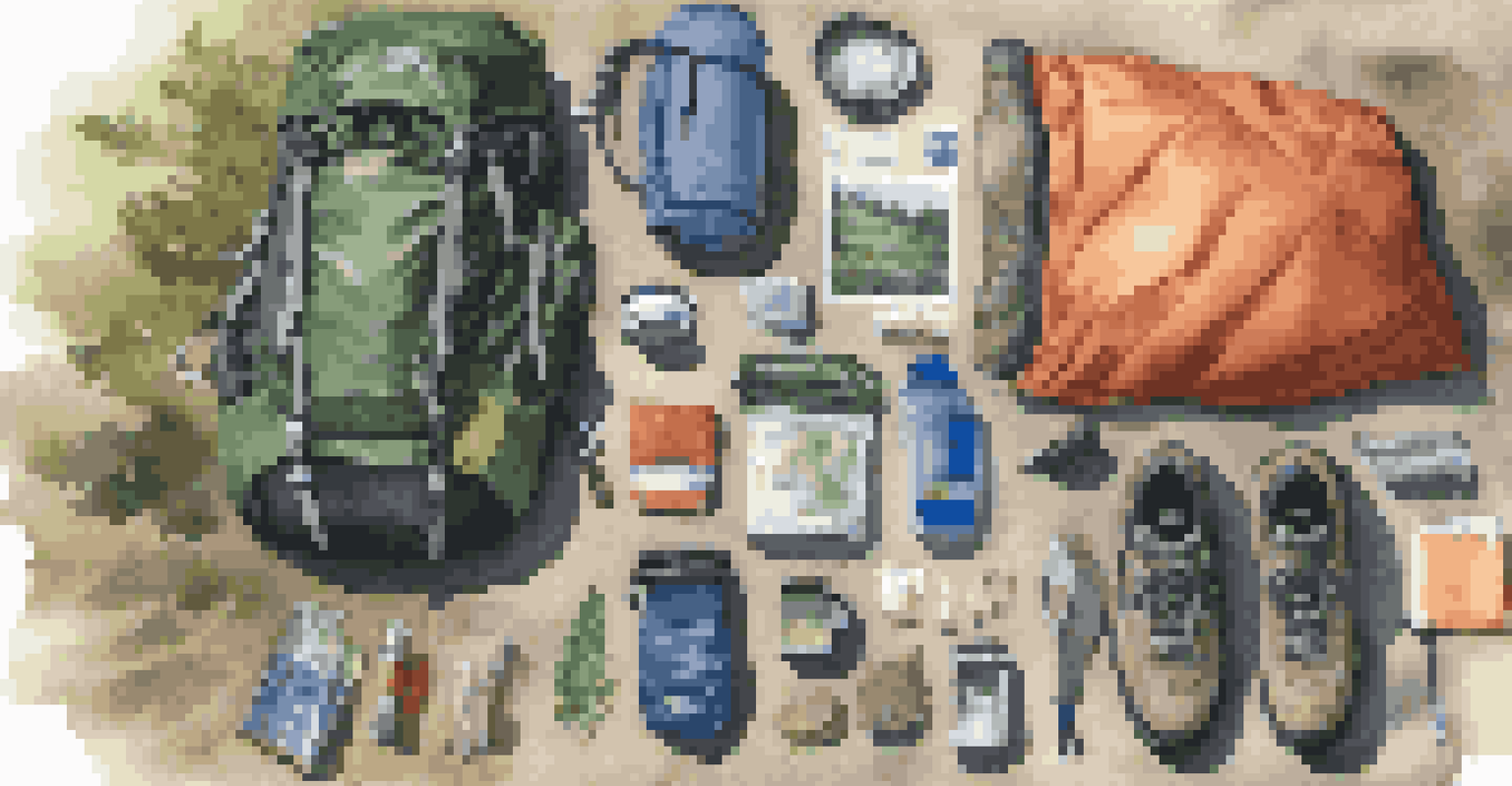Planning Your First Backpacking Trip: A Beginner's Guide

Understanding the Basics of Backpacking for Beginners
Backpacking is an adventurous way to explore the great outdoors, combining hiking and camping. It allows you to reconnect with nature while challenging yourself physically and mentally. Before you head out, it's important to grasp the basic concepts of backpacking, including gear, trails, and safety.
In every walk with nature one receives far more than he seeks.
Think of backpacking as a journey where your backpack carries everything you need for survival and comfort. This includes essentials like food, water, a sleeping bag, and a tent. Understanding the balance between what to take and what to leave behind is key to a successful trip.
As a beginner, it's helpful to start with short trips in familiar areas. This way, you can get a feel for the gear and the experience without overwhelming yourself. With practice, you'll build confidence and prepare for more challenging adventures.
Choosing the Right Destination for Your First Trip
Selecting the right destination is crucial for your first backpacking trip. You want a location that offers manageable terrain and well-defined trails. Research local parks or forests that cater to beginners, ensuring they have established campsites and resources available.

Consider factors like weather, elevation changes, and trail difficulty when making your choice. A flat, scenic trail with plenty of water sources is ideal for newcomers. Don't hesitate to reach out to local hiking clubs or online forums for recommendations.
Start with Basics for Success
Understanding essential gear, safety, and planning is crucial for a successful backpacking experience.
Remember to check if you need any permits or if there are any seasonal restrictions. Being aware of your chosen destination's regulations will help you avoid any surprises while you're out exploring the wilderness.
Essential Gear You Need for Backpacking
Having the right gear is a game-changer for your backpacking experience. Start with a well-fitted backpack that can comfortably carry your supplies. Look for one that distributes weight evenly and has enough capacity for your trip's duration.
The journey of a thousand miles begins with one step.
Other must-have items include a quality tent, sleeping bag, and cooking equipment. Selecting lightweight materials will save you from feeling bogged down during your hike. Researching and investing in gear that's designed for backpacking will pay off in comfort and durability.
Don't forget about clothing! Dress in layers to accommodate changing weather conditions, and opt for moisture-wicking fabrics. A good pair of hiking boots is essential for keeping your feet happy on the trail, so make sure they’re broken in before you set out.
Planning Your Backpacking Itinerary and Duration
When planning your itinerary, consider how long you want to be on the trail each day. Beginners often benefit from shorter hiking days, allowing time to set up camp and relax. A good rule of thumb is to plan for 2-3 miles per hour, factoring in breaks and elevation changes.
Sketching out a rough itinerary helps you stay organized and ensures you don’t miss any must-see spots. Include your start and end points, daily mileage, and potential camping areas. Flexibility is key, as nature can throw curveballs, but having a plan will guide you.
Choose Your Destination Wisely
Selecting a beginner-friendly location with manageable terrain and established trails can enhance your first trip.
Also, consider your physical fitness and experience level when determining your trip duration. A weekend trip is usually a great start, giving you a taste of the adventure without overwhelming yourself. Remember, it’s about enjoying the journey, not rushing to the finish line.
Packing Smart: Tips for Carrying Your Gear
Packing smartly can make all the difference in your backpacking experience. Start by laying out all your gear and supplies before you pack. This will help you visualize what you need and what can be left behind, ultimately lightening your load.
When packing your backpack, place heavier items close to your back and at the center for better balance. Distributing weight properly will help you maintain stability on the trail. Use packing cubes or stuff sacks to organize smaller items and maximize space.
It’s also wise to keep your essentials accessible, such as snacks, water, and a first aid kit. This way, you won’t have to dig through your pack every time you need something. Remember, a well-packed backpack sets the tone for an enjoyable hike!
Staying Safe: Backpacking Safety Tips for Newbies
Safety should always be a top priority when backpacking. Start by sharing your itinerary with someone you trust, so they know where you'll be. Cell service can be spotty in remote areas, so planning ahead is essential for ensuring someone knows your whereabouts.
Familiarize yourself with basic first aid and carry a small kit with essential supplies. Accidents can happen, and being prepared will give you peace of mind. Additionally, knowing how to navigate using a map and compass can be invaluable if you lose your way.
Embrace the Journey Outdoors
Backpacking is about enjoying nature and the experience, so take time to appreciate your surroundings and reflect on your adventure.
Always be aware of your surroundings and trust your instincts. If something feels off, don’t hesitate to change your plans. Respect wildlife and follow local guidelines to ensure both your safety and the protection of the environment.
Enjoying the Experience: Embrace the Great Outdoors
Backpacking is as much about the journey as it is about the destination. Take the time to enjoy the beauty around you, whether it's a stunning view or the sounds of nature. Allow yourself to disconnect from daily distractions and immerse yourself fully in the wilderness.
Consider keeping a journal to document your experiences and feelings throughout your trip. Reflecting on your adventures can deepen your appreciation for nature and help you remember the highlights. Plus, it's a great way to track your progress as you become more seasoned.

Lastly, remember to leave no trace. Respect the environment by following Leave No Trace principles, ensuring that future generations can enjoy the same experiences you did. Embrace the adventure, learn from it, and have fun exploring the great outdoors!